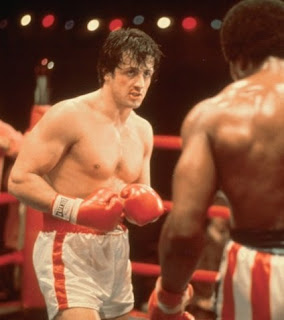The High Road

Author: Andy Robbins
In 1976, a struggling screen writer hit it big with his script of “Rocky.” Sylvester Stallone created a character partly from a real person and partly from fiction that has been loved by moviegoers for more than 30 years. The story of Rocky parallels our spiritual lives in some compelling ways.
As the story opens, Rocky Balboa, a 30-year-old small time boxer who couldn’t be called a has-been because he was more like a never-was, is trading punches in a dank, smoky club in downtown Philadelphia. Energized by an illegal head butt, Rocky flies into a rage and pounds his opponent into submission. A few minutes later in the locker room while recovering with a cigarette, he collects his measly earnings and goes home to his ramshackle apartment.
Meanwhile, the elite boxing champion of the world, Apollo Creed, having run out of opponents who can even challenge his level of expertise in the ring, is looking for a way to enliven his career. He and his team decide to celebrate Independence Day by having a boxing extravaganza in Philadelphia, the city where Democracy began. Exploring the list of possible candidates for the fight, they are not looking for fighting experience necessarily, because no one has ever come close to beating this particular champ anyway. They are looking for something that will create a buzz, a worthy headline. They finally decide upon an unknown, Rocky Balboa, because he is a native of Philadelphia and goes by the fighting name of The Italian Stallion. Perfect.
Upon receiving the invitation, Rocky declines at first, but after being persuaded, his life takes on new meaning. All the sudden he has something significant to shoot for. He doesn’t believe he can beat the champ, but no one has ever gone an entire 15 rounds with Apollo Creed, so he sets his sights for going the distance.
 This goal revitalizes Rocky. He gets a trainer and begins grueling daily workouts. Gone are the cigarettes and beer – instantly. Enter, instead, 4:00 am runs at the docks after having downed a half dozen raw eggs. Instead of staying in just good enough shape to beat a few bums once in a while down at the club, now his training takes on a new tenacity that allows him to endure the pain when his muscles and lungs scream for relief. In a few months he is a chiseled boxing machine, and accomplishes what nearly everyone thought was impossible – he went the distance with the champ.
This goal revitalizes Rocky. He gets a trainer and begins grueling daily workouts. Gone are the cigarettes and beer – instantly. Enter, instead, 4:00 am runs at the docks after having downed a half dozen raw eggs. Instead of staying in just good enough shape to beat a few bums once in a while down at the club, now his training takes on a new tenacity that allows him to endure the pain when his muscles and lungs scream for relief. In a few months he is a chiseled boxing machine, and accomplishes what nearly everyone thought was impossible – he went the distance with the champ.
In my years of weight training, I have noticed that there are two kinds of people who frequent gyms: Those who WANT to get fit, and those who actually are GETTING fit.
The first group would like to get fit as long as they can go to the gym and socialize and half-heartedly move a few weights around and not really change anything about their lives otherwise. In other words, their “yes” for physical fitness really isn’t strong enough to overcome a bigger “yes,” which is the “yes” that calls for chips and sodas and hot dogs and burgers and milk shakes and endless sedentary hours in front of the computer and TV. Those things are really more important than their desire for fitness. These poor souls buy expensive memberships at health clubs but rarely do they show any progress for their time and money.
The second group is all-out committed to whatever it takes to reach their goals. If that means giving up fast food, no problem. If it means five to ten hours a week in the gym, they find the time. If it means enduring gut-busting workouts that leave them spent for the balance of the day, bring it on. If it means scheduling their eating every three hours, and eating stuff they may have hated as a kid, well, they suck it up and do it. If it means not being able to socialize when they are at the gym because they can hardly breathe, let alone carry on a conversation, it’s all in a day’s work. And these committed ones show the fruits of their labor. They make sacrifices in several areas of their lives so that they can enjoy the outcome of hard, lean, healthy, strong bodies.
So how does all this talk of physical training apply to the spiritual life? Don’t you see a parallel here? There are those who sign up for this life of faith, but all they really want is fire insurance. They never really fall in love with the things of God. They never really develop a burning “yes” inside to the things of God enough to let go of the self-life that holds them back from enjoying the benefits of a truly Godly life. They compromise. They indulge their base appetites and rationalize their decisions. They dabble in prayer and flirt around with Bible reading – if indeed they pray and read the Bible at all, and they attend Sunday service to ease their consciences. But they have other “loves” – other things that they have set their hearts upon more than God. They want salvation as long as it is not uncomfortable and doesn’t cost them anything. They want their fire insurance and their indulgences too. In short, they are at best double-minded, and at worst, they are idolaters and false converts.
Like the first group I talked about who buy gym memberships just to play around on the exercise machines, these poor souls have never had a glimpse of the high road of true righteousness and spirit-led living, and the incredible benefits that that kind of life might yield. They wear the label of Christian and are able to talk a good talk at church, but if examined, their lives would be indistinguishable from their godless counterparts. And then they wonder why their marriage is so empty, why their children have so many problems, why they can’t get a handle on their finances, why they are depressed and on anxiety medication, and why life lacks passion and purpose.
Too many Christians I know have never experienced the “joy that surpasses all understanding” that Christians are supposed to have, but instead feel a vague sense of boredom, emptiness, and frustration with their spiritual lives. Why?
Could it be that there are levels of blessing and intimacy with God reserved only for the most deeply committed, those willing to set aside anything and everything that may compete with God for their affections? Perhaps somewhere underneath the buzz of lives saturated with surfing the net, watching TV, going to the movies, blogging, dining out, exercising endlessly, and working more than we should, there is a quiet place where God desires to meet us. Perhaps there is a standard of obedience to God’s precepts that is far and away higher than the status quo where only the bravest souls are willing to go, because that is a place of self-sacrifice. But paradoxically, that is the very place of the richest blessings. If you read Psalm 15, you may get a sense of what I’m talking about. It is to these who are committed on this level whom God chooses to confide in and make Himself known to. Like Rocky who was willing to replace comfort and familiarity for excruciating training because he set his sights higher than what he had previously known or accomplished, and who was willing to take a merciless beating so that he could be found standing when the final bell rang out, there is a level of joy, peace, and accomplishment that only the high road of serious spiritual training and perseverance through trial and error can yield.
 Do you not know that in a race all the runners run, but only one gets the prize? Run in such a way as to get the prize. Everyone who competes in the games goes into strict training. They do it to get a crown that will not last; but we do it to get a crown that will last forever. Therefore I do not run like a man running aimlessly; I do not fight like a man beating the air. No, I beat my body and make it my slave so that after I have preached to others, I myself will not be disqualified for the prize. -1 Corinthians 9:24-27
Do you not know that in a race all the runners run, but only one gets the prize? Run in such a way as to get the prize. Everyone who competes in the games goes into strict training. They do it to get a crown that will not last; but we do it to get a crown that will last forever. Therefore I do not run like a man running aimlessly; I do not fight like a man beating the air. No, I beat my body and make it my slave so that after I have preached to others, I myself will not be disqualified for the prize. -1 Corinthians 9:24-27
Jim Elliot said, “He is no fool who gives up what he cannot keep in order to gain what he cannot lose.” Think about it.
___________________________
(Side note: That phrase, disqualified for the prize, in verse 27 of 1 Corinthians 9, is translated “cast away” in the King James, and is the word adokimos in the original Greek, which literally means unapproved, rejected, worthless. The Apostle Paul, who penned these words, was apparently not a Calvinist who believed in unconditional eternal security. He wrote that even he could be rejected if he did not stay the course. Interesting, huh?)
